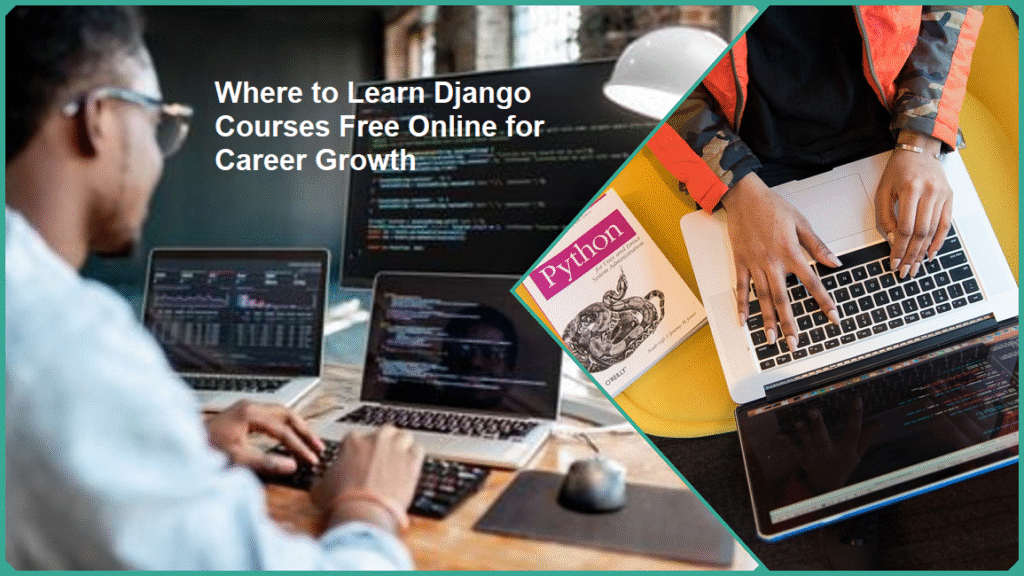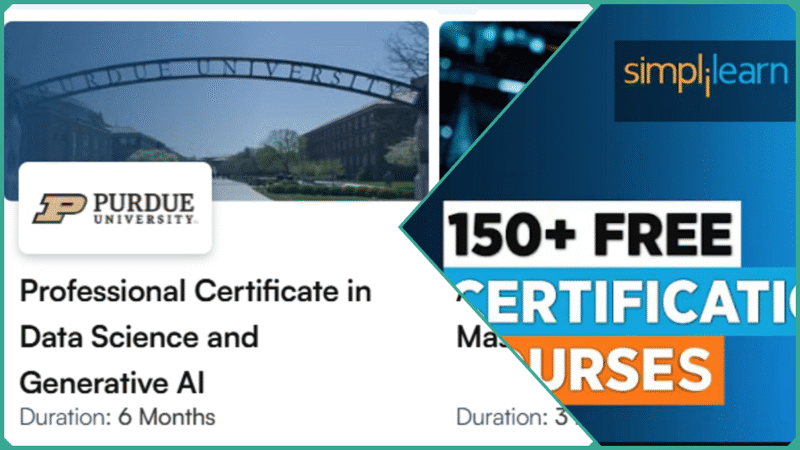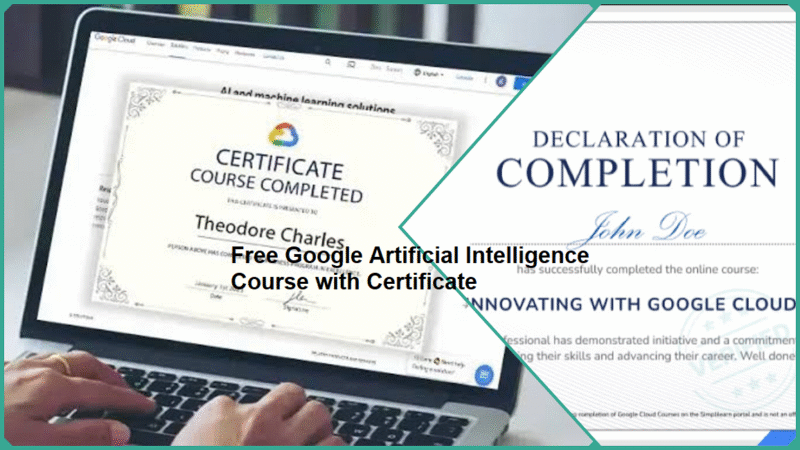Where to Learn Django Course Free Online for Career Growth
Mastering popular web development frameworks such as Django can greatly improve and expand your career opportunities in today’s rapidly changing and highly competitive technology landscape. Django, known as a powerful high-level Python web framework, is widely praised for enabling rapid application development along with its clean, pragmatic, and efficient design principles.
Whether you are a beginner aspiring to become a professional web developer, someone looking to switch careers into tech, or a dedicated self-learner eager to enhance your skill set, discovering and accessing free, high-quality Django courses available online is essential. These resources allow you to begin or accelerate your learning journey effectively without facing any financial obstacles or constraints.
This blog post delves into the best places to learn a Django course free online, showcasing top platforms that provide comprehensive, beginner-friendly, and certificate-backed courses to help you master Django effectively.

In addition, we will explore the reasons why Django is a highly valuable skill for advancing your career, examine the latest trends in Django development, and share practical tips to help you succeed and stay motivated throughout your entire learning journey.
Why Learn Django for Career Growth?
Learning Django is an incredibly strategic and beneficial move for anyone aiming to accelerate their career growth, especially in the field of web development. This is largely because Django has been widely adopted by numerous companies around the world to build web applications that are not only scalable but also secure and easy to maintain over time.
Below, we outline the key reasons why Django stands out as an exceptionally valuable and sought-after skill in today’s highly competitive and ever-evolving job market:
- Rapid Development: Django adheres to the Model-View-Controller (MVC) architectural pattern, which enables developers to create complex and feature-rich applications in a relatively short amount of time. This streamlined approach significantly accelerates the overall development process, allowing projects to be delivered faster without compromising quality. As a result, Django becomes an especially appealing choice for employers who prioritize high productivity and timely project completion.
- Security: Django includes comprehensive built-in protections designed to defend against a wide range of common web vulnerabilities, including SQL injection attacks, cross-site scripting (XSS), and cross-site request forgery (CSRF). These robust security features help developers build applications that are inherently more secure by default, reducing the risk of data breaches and unauthorized access. Because of these strong safeguards, Django has become a trusted and preferred framework for creating secure, reliable web applications—an increasingly vital consideration as businesses face growing security challenges and regulatory requirements in today’s digital landscape.
- Scalability: Django is designed to support large-scale applications effectively, making it an excellent choice for both emerging startups and well-established large enterprises. Its robust architecture and efficient components allow it to manage increasing traffic volumes and substantial data loads seamlessly, which guarantees that projects remain sustainable and relevant over time across a wide variety of different environments and use cases. This capability ensures that as your application grows in complexity and user base, Django can continue to provide reliable performance and support future expansion without compromising quality.
- Versatility: Django is an incredibly versatile framework that goes beyond just building traditional websites; it is also extensively used to power APIs and backend services that support various applications. This remarkable flexibility opens up a broad spectrum of job opportunities, ranging from web development and backend engineering to creating complex data-driven applications and services. As a result, professionals skilled in Django can explore diverse roles across multiple industries, enhancing their career prospects significantly.
- High Demand and Competitive Salaries: Django developers are in strong demand across industries such as web development, software engineering, and data science. According to recent salary data in the United States, the average Django developer earns around $120,000 to $130,000 annually, with top earners making over $134,000 per year. In the UK, median salaries hover around £66,250 annually, reflecting robust demand in Europe as well. Even in emerging markets like India, Django developers earn competitive salaries averaging around ₹4,10,000 per year, with opportunities for growth as experience increases.
- Job Security and Career Flexibility: Due to Django’s rapidly growing adoption across a wide range of startups as well as well-established, large-scale companies, professionals who possess strong skills in Django enjoy a high degree of job security. The framework’s continued relevance and widespread use in modern web development and API creation guarantee that Django developers remain highly valuable and sought-after assets within the ever-evolving technology workforce. This combination of demand and versatility provides professionals with ample opportunities for career growth and flexibility in various industries.
In summary
Django’s powerful combination of rapid development capabilities, robust security features, impressive scalability, and versatile applications, along with its consistently high market demand, makes it an outstanding choice for career changers, recent graduates, and self-learners who are eager to enter or advance their careers in the competitive tech industry.
By mastering Django, you not only open the door to a wide range of lucrative job opportunities but also gain proficiency in a framework that is future-proof, highly respected, and widely adopted across the ever-evolving software development landscape. This skill set positions you strongly for long-term success and growth in the technology sector.
Key Concepts and Frameworks in Django
Before diving into Django courses, it’s essential to first gain a solid understanding of its key concepts and the various framework components that serve as the fundamental building blocks. These elements collectively form the backbone required for efficiently building robust, scalable, and maintainable web applications with Django.
Grasping these foundational ideas will greatly enhance your ability to work effectively within the Django environment and make the learning process smoother and more productive:
Python Foundation
Django is built on top of Python, which is widely recognized as one of the most popular and beginner-friendly programming languages available today. Having a basic understanding of Python syntax and fundamental programming concepts is crucial because Django takes full advantage of Python’s simplicity and powerful features to make web development much more efficient and streamlined.
This foundational knowledge helps developers easily grasp Django’s framework and tools, enabling them to build robust web applications faster and with greater ease.
MVC / MVT Architectural Pattern
Django follows a design pattern that is commonly known as Model-View-Template (MVT), which is essentially a distinctive variation of the more traditional and widely recognized Model-View-Controller (MVC) architecture used in many web development frameworks:
- Model: Represents the data layer. Models define your data structure and handle database interactions using Django’s powerful Object-Relational Mapping (ORM). This abstraction allows you to work with databases using Python code instead of raw SQL queries.
- View: Contains the business logic that processes user requests and returns responses. Views retrieve data from models and render the appropriate templates. In Django, views act as controllers, managing how data is presented and interacted with.
- Template: Manages the presentation layer. Templates are HTML files with embedded Django Template Language (DTL) syntax, which dynamically injects data from views into web pages for display.
URL Routing
Django’s URL dispatcher is a powerful system that maps incoming URL patterns to specific views within your application. This flexible routing mechanism enables you to create clean, organized, and highly readable URLs, which not only improve the overall user experience but also make your site more search engine-friendly.
By carefully controlling how different types of requests are handled, you can ensure that visitors navigate your site smoothly and efficiently, enhancing both usability and SEO performance significantly.
Models and Database Interaction
Django’s models are specialized Python classes that serve as blueprints for defining your application’s entire data schema in a clear and structured way. By leveraging Django’s powerful Object-Relational Mapping (ORM) system, these models significantly simplify complex database operations such as creating new records, reading existing data, updating entries, and deleting records—all without the need to write any raw SQL queries manually.
In addition to these convenient features, Django models also fully support migrations, which provide a seamless and efficient way to evolve and manage your database schema over time as your application requirements change and grow.
Templates and Presentation
The template system effectively separates the presentation layer from the underlying business logic, ensuring a clear division of responsibilities. Templates utilize a designer-friendly syntax specifically created to render dynamic content seamlessly, which enables frontend developers to work independently without needing to interact directly with the backend logic or code.
This approach promotes better collaboration between designers and developers, allowing each team to focus on their respective areas efficiently while maintaining a flexible and maintainable codebase.
Forms and User Input Handling
Django offers a comprehensive and powerful forms framework designed to help developers create, validate, and process user input securely and efficiently. This framework makes it significantly easier to manage data coming from HTML forms by providing built-in mechanisms for validation, detailed error handling, and robust protection against various security threats, including CSRF (Cross-Site Request Forgery) attacks.
By leveraging Django’s forms framework, developers can ensure that user input is handled safely while simplifying the overall data processing workflow.
Admin Interface
One of the most notable and impressive features of Django is its automatically generated admin interface, which offers a fully functional and ready-to-use backend system for managing various aspects such as site content, user accounts, and data records.
This powerful feature significantly accelerates the overall development process by eliminating the need for developers to spend additional time and effort creating custom admin panels from scratch. As a result, it streamlines site management and enhances productivity, allowing teams to focus more on building application features rather than administrative tools.
REST Framework for APIs
For developing contemporary web and mobile applications, Django can be significantly enhanced by integrating it with the Django REST Framework (DRF), which allows you to build highly robust and scalable APIs.
The Django REST Framework greatly simplifies the process of creating RESTful endpoints, making it much easier to design and implement interfaces that enable your Django application to efficiently serve data to a wide variety of other platforms or external services. This combination empowers developers to extend the functionality of their applications and ensure seamless communication across different systems.
Middleware
For modern web and mobile applications, Django can be significantly extended by incorporating the powerful Django REST Framework (DRF) to build highly robust and scalable APIs. The Django REST Framework makes it much easier and more efficient to create RESTful endpoints, allowing your Django application to seamlessly serve data to a wide range of other platforms, clients, or services.
This integration enhances the flexibility and interoperability of your web projects, enabling smooth communication between different systems and front-end technologies.
Mastering these essential core concepts and fundamental frameworks thoroughly equips you with the skills needed to efficiently build highly scalable, secure, and easily maintainable web applications using Django. This strong foundational knowledge not only enhances your development capabilities but also prepares you to effectively leverage Django’s extensive ecosystem, rich features, and valuable community resources to their fullest potential.
Top Free Online Platforms to Learn Django Course Free
If you’re eager to learn a Django course free online to enhance your career prospects and expand your skill set, here’s a thoughtfully curated and comprehensive list of the best platforms that offer high-quality, beginner-friendly Django courses.
Many of these courses come with certificates of completion, and the best part is they are available to you completely free of charge, making it easier than ever to start your Django learning journey without any financial commitment:
| Platform | Course Name / Description | Features & Benefits | Certificate |
|---|---|---|---|
| SkillUp by Simplilearn | Python Django 101 Course | 2 hours of self-paced videos, hands-on projects, and beginner-friendly | Yes, a free certificate |
| Alison | Free Django Courses | Covers basics to advanced topics, CPD-accredited certificate | Yes |
| Noble Desktop | Free Django Tutorials & Hands-on Training | Free tutorials plus paid bootcamps, live instructor support | Paid options |
| Coursera | Django for Everybody (University of Michigan) | Comprehensive specialization, free to audit | Certificate paid |
| Udemy | Free Django Courses & Tutorials | Project-based learning, quizzes, beginner to advanced levels | No |
| LearnDjango.com | Django for Beginners | Project-based, open-source resources | No |
| YouTube | Learn Django from Scratch (various channels) | 100% free, project-based, beginner-friendly | No |
| Cursa.app | Free Django Courses with Certificate | Backend development focus, free certificate | Yes |
| Class Central | Aggregated Django Courses from top universities | Free and paid options, certificates, hands-on projects | Paid certificates |
Highlights of Popular Free Django Courses
SkillUp by Simplilearn
- SkillUp by Simplilearn: Python Django 101
- Duration: 2 hours of self-paced video lessons
- Content: Covers Django fundamentals, MVC architecture, and building functional web elements
- Certificate: Free certificate upon course completion
- Why it stands out: Beginner-friendly, practical projects, a certificate recognized by employers
Provides an efficient, concise 2-hour course designed specifically for beginners, featuring hands-on practical projects that enhance learning and retention. This course also includes a free certificate upon completion, making it an excellent choice for those looking to quickly acquire new skills and boost their resume.
Alison
- Alison Free Django Courses
- Content: From basic to advanced Django concepts, including secure and scalable app development
- Certification: CPD-accredited certificates to boost your resume
- Audience: Ideal for learners seeking formal recognition without cost
Offers a wide and comprehensive range of Django courses that cover everything from the very basics to highly advanced topics. Each course is designed to help learners build solid expertise, and upon completion, you receive CPD-accredited certificates that can significantly enhance and boost your professional profile, making you stand out in the job market.
Noble Desktop
- Noble Desktop Free Tutorials
- Offerings: Free tutorials plus paid bootcamps with live instructor feedback
- Additional benefits: One-on-one mentorship, portfolio creation, flexible payment plans for paid courses
- Ideal for: Learners who want a mix of free resources and optional paid mentorship
Noble Desktop’s free tutorials serve as an excellent entry point into Django, especially for beginners who want to understand the basics without upfront costs. When ready, learners can upgrade to paid bootcamps offering live instruction, mentorship, and career support, making it a comprehensive learning path from free exploration to professional mastery.
Coursera
- Coursera – Django for Everybody (University of Michigan)
- Structure: Multi-course specialization covering Django basics, deployment, and APIs
- Access: Free to audit; certificate available for a fee
- Reputation: University-backed, highly rated by learners worldwide
Coursera’s Django for Everybody is a comprehensive university-backed specialization that thoroughly covers both the fundamental concepts and more advanced topics related to Django development. This course is designed to provide a solid foundation for beginners as well as deeper insights for those looking to expand their skills.
You have the option to audit the course completely for free, allowing you to access all the instructional materials without any cost. If you wish to receive an official certification to showcase your achievement, you can choose to pay for the certification at any point.
Udemy
- Udemy Free Django Courses
- Format: Project-based learning with quizzes and hands-on coding challenges
- Focus: Real-world projects like portfolio sites and product clones
- Accessibility: Free courses available with optional paid upgrades
Udemy offers a wide range of free Django tutorials that emphasize hands-on projects, interactive quizzes, and practical coding exercises designed to help learners build real-world skills. While these courses provide valuable learning experiences, it is important to note that certificates of completion are typically not included for free and usually require an additional purchase.
YouTube Channels
Popular and widely respected creators such as Corey Schafer, The Net Ninja, and Dennis Ivy provide a wealth of in-depth, comprehensive, and completely free Django tutorials. These tutorials are highly regarded and consistently praised for their exceptional clarity, detailed explanations, and emphasis on project-based learning, making them ideal resources for beginners and intermediate developers looking to deepen their understanding of Django development.
LearnDjango.com
Offers a wide range of open-source, project-driven tutorials that are perfectly suited for self-paced learners. These tutorials are designed to help individuals develop practical skills by building real-world applications step-by-step, making the learning experience both engaging and highly effective.
Additional Resources
GeeksforGeeks
Offers a comprehensive and free Django course that covers a wide range of topics, starting from the very basics like installation and setup, all the way through to more advanced concepts such as building RESTful APIs and deploying Django applications.
This course is designed to provide learners with a thorough understanding of Django, making it suitable for beginners as well as those looking to deepen their knowledge and skills in web development using this powerful framework.
Reddit Recommendations
Many learners on Reddit highly recommend beginning with the official Django documentation as it provides a comprehensive and detailed overview of the framework. Additionally, the Django Girls tutorial is frequently suggested because it offers a very beginner-friendly and approachable introduction, making it easier for those new to web development to grasp the fundamental concepts and get started quickly. Together, these resources form an excellent foundation for anyone looking to learn Django effectively.
Class Central
This platform aggregates a wide variety of both free and paid Django courses offered by some of the top universities around the world. It enables you to easily browse and select courses that best fit your individual learning preferences, whether you prefer self-paced study or structured programs.
Additionally, Class Central provides options that cater to your certification requirements, helping you find courses that offer official credentials upon completion to enhance your professional profile.
Why These Platforms?
These platforms seamlessly combine high-quality content, hands-on practical projects, and flexible learning schedules—all essential elements for learners who are eager to develop job-ready Django skills without having to make any financial investment.
Many of these platforms also offer certificates upon completion, which can significantly enhance your resume and LinkedIn profile, making them highly valuable for career advancement and strengthening your job application prospects.
Choosing the right free Django course depends on your learning style:
- Prefer structured, university-backed courses with comprehensive curricula? Try platforms like Coursera or Alison, which offer a wide range of professionally developed courses from renowned universities and institutions around the world.
- Looking for quick, project-based tutorials to enhance your skills efficiently? Platforms like SkillUp and Udemy offer excellent options that provide a wide range of practical courses designed to help you learn by doing, making your learning experience both effective and enjoyable.
- Do you enjoy watching video tutorials and benefiting from community support? If so, YouTube channels such as Corey Schafer’s offer an excellent resource. They provide detailed, easy-to-follow tutorials that can help you learn new skills effectively while also connecting you with a supportive community of learners and experts.
- Looking for open-source, self-paced learning resources? LearnDjango.com is an excellent option that fits these needs perfectly. It offers a comprehensive and flexible approach to mastering Django at your own pace, making it an ideal choice for learners seeking independence and accessibility.
Beginning your learning experience with any of these options will establish a strong and reliable foundation for your journey into Django. This solid groundwork will not only enhance your understanding but also significantly increase your opportunities, opening numerous doors to exciting and rewarding careers in the field of web development.
Current Trends and Developments in Django
Current trends and developments in Django demonstrate its continuous evolution and adaptation to address the ever-changing needs of modern web development. This ongoing progress ensures that Django retains its status as one of the leading and most popular Python frameworks as we move further into 2025.
Below, we explore the key trends that are actively shaping the future of Django, highlighting why staying informed and up-to-date with these advancements is essential for anyone looking to grow and advance their career in the web development industry.
- Django REST Framework (DRF) Popularity: Django REST Framework continues to gain traction as the go-to tool for building APIs. With the rise of mobile apps and single-page applications (SPAs), RESTful APIs are critical for enabling seamless communication between frontends and backends. DRF simplifies API development with features like serialization, authentication, and viewsets, making Django highly relevant for modern web and mobile projects.
- Asynchronous Support: Django has been progressively enhancing its asynchronous capabilities to improve performance for real-time and high-concurrency applications. The introduction of async views, middleware, and testing tools in recent releases (notably Django 5.0 and 5.2) allows developers to write non-blocking code, which is essential for chat apps, live updates, and other interactive features.
- Cloud Deployment Integration: Deploying Django applications on cloud platforms like AWS, DigitalOcean, and Google Cloud is becoming standard practice. Django’s compatibility with containerization (Docker), serverless architectures, and cloud databases simplifies scalable and cost-effective deployment, aligning with industry trends toward cloud-native development.
- Security Enhancements: Django maintains its reputation for robust security by continuously updating built-in protections against threats such as SQL injection, cross-site scripting (XSS), and cross-site request forgery (CSRF). The framework’s security-first design philosophy and regular patch releases ensure applications built with Django remain resilient against evolving cyber threats.
- Community Growth and Ecosystem Expansion: Django benefits from a vibrant open-source community that actively contributes to its ecosystem. This includes third-party packages, plugins, and tools that extend Django’s functionality, such as GraphQL integration, WebSockets support, and WebAssembly compatibility. The community also drives improvements in documentation, developer experience, and administrative interfaces.
- Upcoming Features in Django 5.x Series: The latest Django versions (5.2 LTS and upcoming 6.x and 7.x releases) introduce enhancements like:
- GeneratedField: Allows database-generated columns in models for more flexible data handling.
- Improved Admin Interface: Facet filters and UI improvements for better data management.
- Simplified Form Templates: Cleaner rendering of form fields for maintainable code.
- AsyncClient Enhancements: Better asynchronous testing support for views and middleware.
Why These Trends Matter for Career Growth
Staying up to date with these important developments ensures that Django developers are well-equipped to:
- Build modern, efficient, and scalable applications that meet industry standards.
- Leverage asynchronous programming to optimize app performance.
- Deploy applications seamlessly on cloud infrastructure.
- Maintain high levels of security compliance.
- Utilize the extensive Django ecosystem to accelerate development.
- Position themselves as competitive candidates for in-demand roles in web development, backend engineering, and API design.
Django’s ongoing innovation, robust security features, and rapidly expanding ecosystem collectively make it a highly future-proof framework for developers and businesses alike. Professionals who actively keep pace with these emerging trends and advancements within Django will discover numerous ample opportunities for meaningful career advancement and deeper technical mastery in the ever-evolving field of web development.
Tips for Success When Learning Django Online
- Set Clear Goals: Define your learning objectives upfront. Are you aiming to build a portfolio, land a job as a Django developer, freelance, or simply acquire new skills? Clear goals help you stay motivated and choose the right courses and projects aligned with your career aspirations.
- Choose the Right Course Format for Your Learning Needs. Django courses are typically offered in two primary formats:
- Self-paced/on-demand: Flexible, affordable, and great for learners who prefer studying at their speed. Platforms like Udemy and Coursera offer many such courses. However, these may lack immediate instructor support.
- Live instructor-led classes: Offer real-time interaction, personalized feedback, and mentorship. Noble Desktop is an example that provides live online Django training with hands-on guidance. This format suits learners who want structured schedules and direct help.
- Practice Regularly: Consistent coding practice is essential. Django is a complex framework, and hands-on experience solidifies your understanding better than passive watching or reading. Try to code daily or several times a week, even if only for short sessions.
- Build Real-World Projects: Apply what you learn by creating projects such as blogs, e-commerce sites, or portfolio apps. This reinforces concepts like models, views, templates, authentication, and REST APIs. Project-based learning also builds a portfolio that impresses employers.
- Engage with the Community: Join Django forums, GitHub repositories, and social media groups. Platforms like Reddit’s r/django or the official Django Forum offer support, code reviews, and networking opportunities. Community engagement helps you solve problems faster and stay updated on trends.
- Leverage Certificates: Many free and paid courses offer certificates upon completion. Use these certificates to showcase your skills on LinkedIn, resumes, and job applications. Certificates add credibility and demonstrate your commitment to learning.
Bonus Tip: Master Prerequisites
Before you start diving into Django, it is essential to first ensure that you have a strong and solid understanding of Python fundamentals. Additionally, having basic knowledge of core web technologies such as HTML and CSS is equally important. Building this foundational knowledge beforehand will make your journey in learning Django much smoother, more efficient, and ultimately more effective.
Summary:
Achieving success in learning Django online largely depends on setting clear and specific goals, selecting the most suitable course format that fits your learning style, maintaining consistent and regular practice, actively working on building practical projects, engaging with the developer community, and effectively utilizing certificates to showcase your skills.
By combining all these essential strategies, you can significantly accelerate your career growth and become fully prepared and job-ready to thrive in the highly competitive and ever-evolving web development market.
FAQs
Is Django hard to learn for beginners?
Django is generally beginner-friendly, especially if you have a basic understanding of Python. However, because Django is a “batteries-included” framework with many built-in features, it can present a steep learning curve for complete newcomers.
Many free courses start with fundamentals and gradually increase complexity to ease learners into the framework. Having some prior knowledge of HTML, CSS, and basic web concepts also helps smooth the learning process.
Can I get a free certificate after completing Django courses?
Several platforms, such as SkillUp by Simplilearn, Alison, and Cursa.app, offer free certificates upon successful completion of their Django courses. These certificates can be valuable for showcasing your skills to employers and enhancing your resume.
Do I need prior programming experience?
While prior experience in Python programming is helpful and often recommended, some Django courses include Python refreshers to bring beginners up to speed. If you are new to programming, it’s advisable to first learn Python basics and familiarize yourself with HTML and CSS before diving into Django to ensure a smoother learning journey.
How long does it take to learn Django?
The amount of time needed can vary significantly depending on your previous experience, background knowledge, and the speed at which you learn new information. Each individual’s learning pace is unique, so the time required may differ greatly from person to person.
- If you already know Python and web basics, you might become proficient in Django within a few weeks to a couple of months with consistent practice.
- For beginners, especially those new to programming, it may take several months to grasp Django’s core concepts and build projects confidently.
Consistency in your study routine, the quality and reliability of the learning resources you use, engaging in hands-on projects that provide practical experience, and having access to experienced mentorship can all play a significant role in greatly enhancing the speed at which you learn new skills and concepts.
Will learning Django improve my job prospects?
Django is widely used by startups and large companies alike for building scalable and secure web applications. Django skills are in high demand for roles such as web developer, backend engineer, and data scientist. Mastering Django can lead to higher salaries, better job security, and more diverse career opportunities in the tech industry.
Summary:
Django is accessible to beginners with some Python knowledge, and many free courses offer certificates to validate your skills. The learning curve can be managed by starting with Python fundamentals and web basics. With dedication and consistent practice, you can learn Django in a few months and significantly enhance your career prospects.
In Conclusion
Learning Django for free online is an accessible and strategic step toward advancing your career in web development and related tech fields. With a wealth of high-quality, free courses available—from SkillUp’s certification course to Alison’s accredited programs, along with project-based tutorials on Udemy and YouTube—you can confidently start your Django journey without any financial investment.
By focusing on hands-on practice, building real-world projects, and leveraging free certificates to showcase your skills, you position yourself strongly for competitive roles in the job market. Staying updated on the latest Django trends, such as asynchronous support and REST API development, further enhances your employability and technical proficiency.
Explore the platforms listed here, choose the course that best fits your learning style and goals, and begin building your Django expertise today. Empower your career with Django—learn for free, create impactful projects, and unlock new professional opportunities.
This approach not only helps you develop and enhance your technical skills but also clearly demonstrates your dedication and commitment to continuous learning and professional growth. By consistently improving your abilities, you position yourself as a highly valuable and attractive candidate for employers within the rapidly expanding and fast-growing technology industry.
![]()






